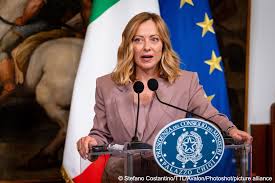Italy: Court seeks to prosecute top government members over al Masri case

Rome: Italy’s Tribunal of Ministers has sent a request to parliament asking to prosecute Justice Minister Carlo Nordio, Interior Minister Matteo Piantedosi and Cabinet Secretary Alfredo Mantovano over Italy’s release earlier this year of a Libyan general wanted for war crimes.
Rome’s Tribunal of Ministers (Tribunale dei Ministri), a special section of the Italian justice system set up to prosecute alleged crimes committed by ministers in office, so called “ministerial crimes”, has sent a request to parliament asking to prosecute Justice Minister Carlo Nordio, Interior Minister Matteo Piantedosi and Cabinet Secretary Alfredo Mantovano over Italy’s release at the beginning of this year of a Libyan general wanted for war crimes.
Nordio, Piantedosi and Mantovano, whose brief puts him in charge of Italy’s intelligence services, are accused of aiding and abetting Njeem Osama al Masri’s return to Libya. The justice minister is also accused of failing to perform his duties. The case against Premier Giorgia Meloni has been dropped.
With this request, a new phase has opened in the case of Njeem Osama al Masri, who was arrested on an International Criminal Court (ICC) warrant at a hotel in Turin at dawn on January 19 and was returned to Tripoli on an Italian state flight following his release on a technicality by a Rome appeals court on January 21.
Al Masri, who was the head of Libya’s judicial police is accused of torture, rape and murder in relation to his management of a detention center in Tripoli, the Libyan capital.
The requests to prosecute Nordio, Piantedosi and Mantovano need to be approved within the next 60 days by the Italian Parliament’s Lower House, where Premier Giorgia Meloni’s ruling center-right coalition has a big majority. Meloni revealed on Monday that she had been notified that the case against her over al Masri’s release had been dropped.
Almasri’s release was ordered after Minister Nordio did not respond to the Rome appeals court’s request to back the arrest.
According to court documents, the appeals court on January 21 ordered al Masri’s release due to a procedural error.
The arrest was not “preceded by talks with the justice minister, who is in charge of relations with the International Criminal Court,” the appeals judges wrote motivating their decision.
The judges said they had informed Nordio’s office on January 20, immediately after receiving the case files from Turin’s central police department, which had arrested al Masri the previous day.
However, they said they had received no answer from the minister regarding his detention, a silence that led to al Masri’s release, judicial sources said.
The Tribunal of Ministers alleges that al Masri was released because the officials feared there could be reprisals against Italian citizens and interests in Libya if he were handed over to the ICC.
Nordio, Piantedosi and Mantovano are accused of aiding and abetting al Masri’s return to Libya and the failure to hand him over to the ICC.
Piantedosi and Mantovano also face embezzlement charges over their decision to expel al Masri and use a state flight to take him back to Libya following his release.
The justice minister is also accused of failing to perform his duties because he did not promptly respond to the Rome appeals court’s request to back the arrest of the suspected torturer, as requested by the ICC, according to investigators. The justice ministry handles all relations with The Hague-based court.
The minister also allegedly failed to respond to multiple requests by the ICC to seize material that could be useful to the investigation against the Libyan general.
Nordio has blamed errors in the ICC warrants, which he described as a “mess;” while Interior Minister Matteo Piantedosi has said Rome was forced to expel the general as he posed a danger to Italy.




